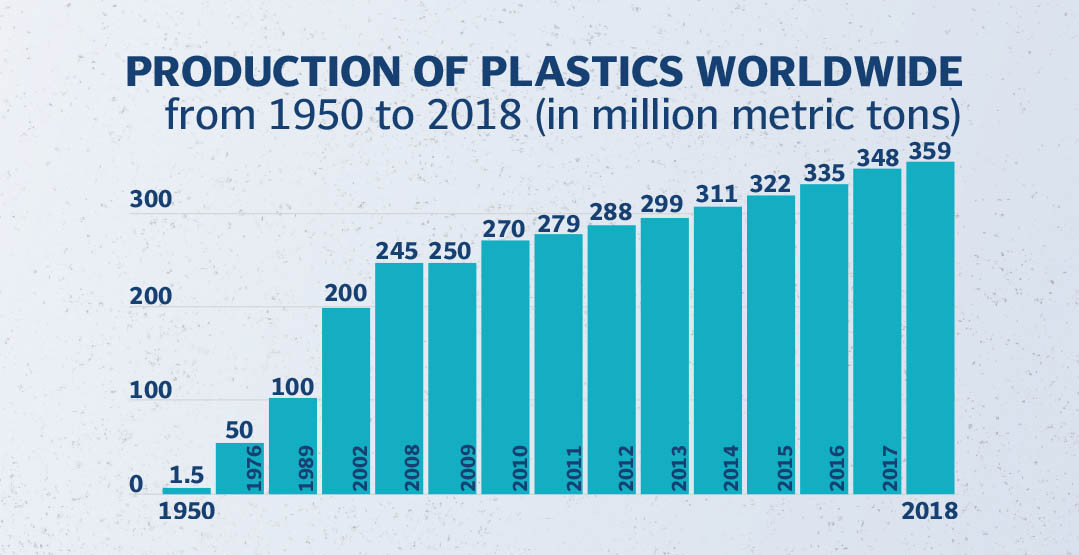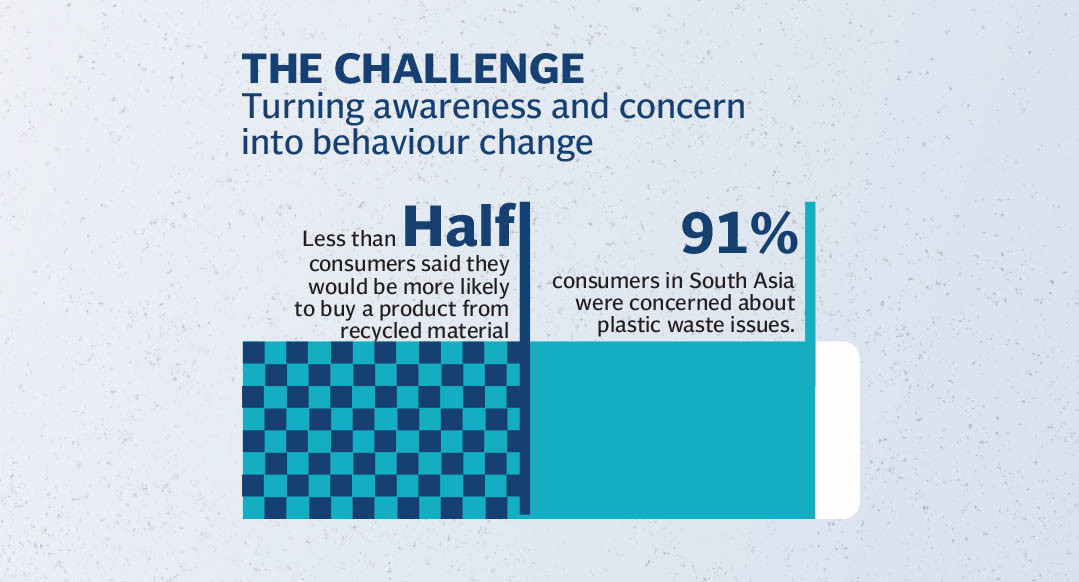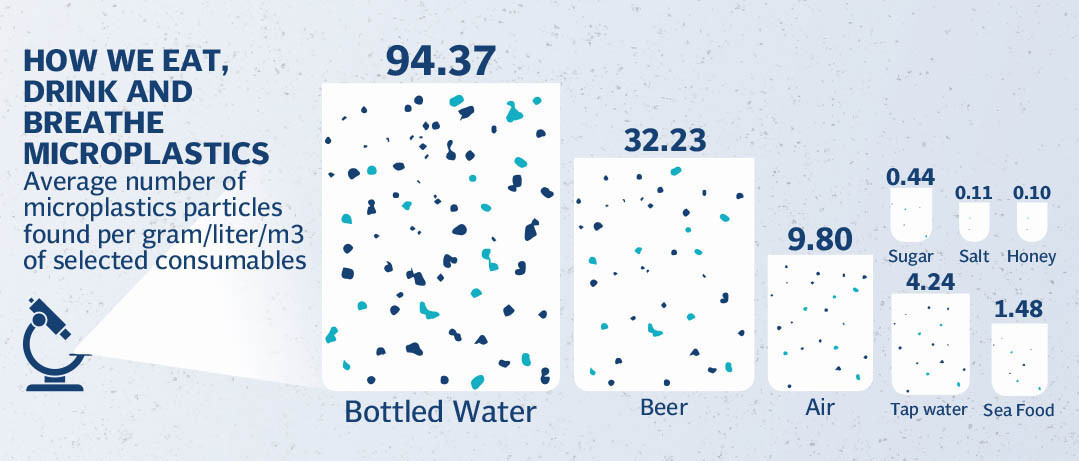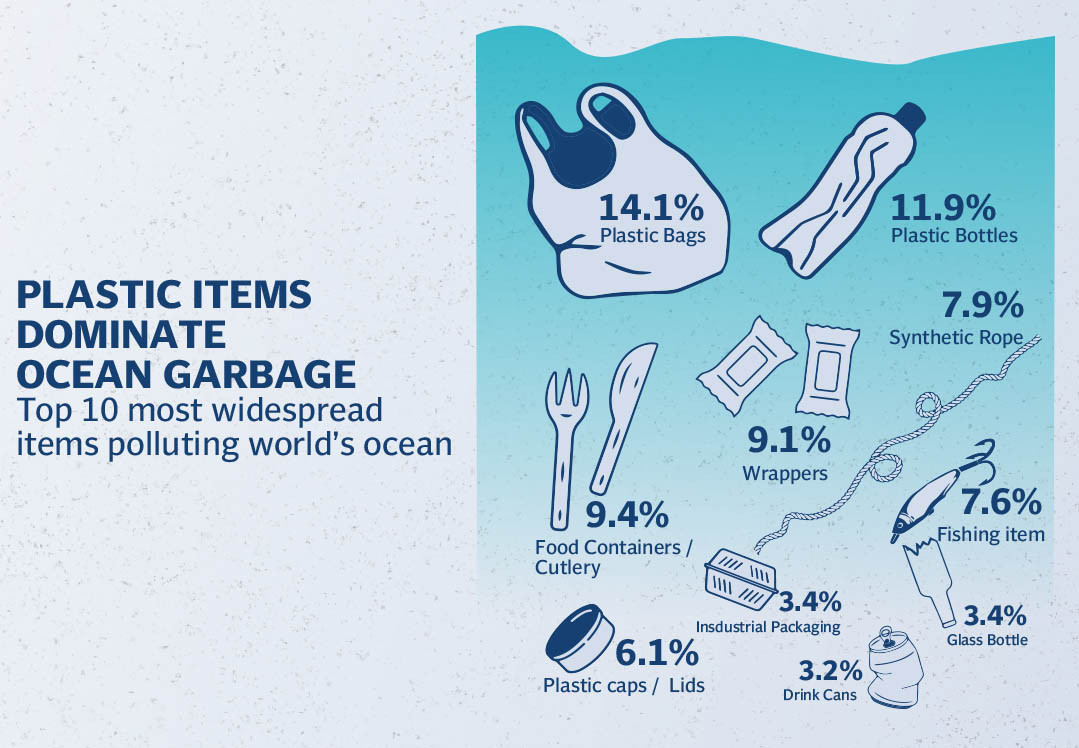Plastic, the omnipresent material in modern society, has undoubtedly transformed the way we live, but its widespread usage has also triggered an escalating global crisis. The UN Environment Programme reports a stark reality that only around 9% of plastic waste is recycled on a global scale, leaving the vast majority to perpetuate environmental degradation and pollution.
Recycling has emerged as a pivotal step in steering humanity toward a more sustainable and eco-friendly future. Notably, recycling plastic waste into valuable raw materials presents a remarkable yet untapped opportunity for young startups and entrepreneurs. In Pakistan, a growing demand for plastic recycling and its potential for innovative solutions has come to light the endeavours of some organisations.
Global plastic waste is a killer
The ubiquity of plastic in our lives has led to alarming environmental and human health effects. Resistant to natural degradation, plastic lingers in landfills and oceans for centuries, breaking down into toxic microplastics that infiltrate ecosystems. The UN Environment Programme acknowledges the urgent need for a global plastics treaty to combat this issue, yet true solutions remain distant.
Being non-biodegradable in nature, accumulating plastic waste has grave implications. Marine life suffers as animals ingest and become entangled in plastic waste, wreaking havoc on ecosystems. Human health is equally at risk, with plastics potentially releasing harmful chemicals into food and drinks. The presence of microplastics in air, water and food raises concerns about long-term health impacts.

Pakistan's plastic predicament
As Pakistan grapples with a severe environmental crisis, clogged waterways and urban flooding caused by solid waste continue to wreak havoc. Unless we adopt effective waste management strategies, these challenges are destined to persist. In a bid to combat this menace, recent initiatives have been taken to ban single-use plastics in the capital city. However, the effectiveness of such bans remains a topic of vigorous debate.
Are bans effective?
Though bans on plastic products have been implemented globally, their success varies based on enforcement, awareness, and alternative availability. Success hinges on factors such as enforcement, public awareness, and the availability of viable alternatives. For instance, countries like Bangladesh and Rwanda have effectively implemented bans on specific plastics, resulting in tangible environmental improvement. Nevertheless, the ubiquitous allure of plastic, driven by its affordability and accessibility, persists as a formidable challenge. Illicit channels often find ways to circumvent these bans, underscoring the complexities of this ongoing battle.
Inspiring models
Sweden's deposit system incentivises recycling, while taxes and levies have effectively reduced plastic usage in countries such as Ireland and Denmark.
When consumers purchase drinks in single-use plastic bottles or aluminum cans, they are required to pay a deposit fee upfront, which they subsequently recoup upon returning the empty container. This innovative approach not only benefits consumers but also provides a powerful incentive for producers. Higher collection rates not only reduce environmental impact but also translate into reduced tax burdens for manufacturers, making this strategy a win-win for all involved.

Smog city takes green steps
In urban areas such as Lahore, the escalating problem of solid waste generation inadvertently opens doors for innovative solutions to address plastic waste challenges. This proliferation of waste offers a fertile ground for young entrepreneurs and startups to delve into recycling practices capable of transforming discarded plastics into profitable and eco-friendly by-products. Amidst this backdrop, efforts are underway in Lahore to harness this potential and underline the pivotal role of recycling initiatives to combat the menace of plastic pollution.
Exploring solid waste landfills
The Institute of Urbanism (an Islamabad-based think tank established in April 2019) and Heinrich Böll Stiftung (a foundation that worked in Pakistan from 1994 to 2019 on the ecology, resource equity, energy, climate change and gender democracy programmes) recently organised an enlightening two-day exposure visit for eco-journalists to solid waste landfill sites operated by Lahore Waste Management Company (LWMC).The visit highlighted the efforts of Green Earth Recycling and Lasani Fibre Industries regarding recycling waste into reusable and sustainable materials.

Turning organic waste to compost
Established in 2010, LWMC claims to be Asia and the region’s largest waste management company in terms of its operations and workforce. With a workforce exceeding 15,000 employees and a fleet of 1,400 vehicles operating round the clock, 5,000-6,000 metric tonnes of waste is collected daily. In addition, 6,000 garbage containers have been placed to ensure efficient waste collection across the city.
“Around 40-60% of green or organic waste is segregated from the total garbage collection for producing compost,” shared Umar Chaudhary, senior manager communications at LWMC. “The compost branded as Balia is an ecologically sound solution and sent to nurseries whereas two consignments have also been sent to the Parks and Horticulture Authority. It is available in 5-20 kg packaging for Rs14/kg and in bulk for Rs8/kg.

Converting waste into energy
Methane is a strong greenhouse gas, much better at trapping heat than carbon dioxide. In 20 years, methane captures 86 times more heat than CO2, when you have the same amount. To cut down on greenhouse gases and prevent water pollution, organic waste is turned into biogas, which is a clean and renewable energy source.
The Lakhodair landfill site managed by LWMC has emerged as an innovative space for waste-to-energy endeavours. Covering an expanse of 200 acres, this site consists of two components: a 60-acre dump area and a 70-acre landfill site, along with associated structures and leachate pools. Approximately 350-400 trips of vehicles are made daily to gather solid waste throughout the city.
At this site, operations are run continuously by 97 workers who operate in shifts around the clock. Through a pilot project, methane gas emitted from landfill heaps is collected and utilised by local industries, thereby contributing to emission reduction.
According to company officials, a local industry that has invested in infrastructure to obtain methane gas from the dumping site to run the plant is in its fifth month of operation in an eco-friendly way. A total five factories get gas supply from the Lakhodair dumping site
LWMC actively promotes and supports budding entrepreneurs in developing inventive recycling solutions. By fostering cooperation and inviting quotations or requests for desired recycled goods, LWMC has forged partnerships between established institutions and emerging startups, eliminating redundancy in the process.
“We produce multiple daily use items such as benches, tables, racks and makeshift bathrooms from plastic waste and our products have a local and international presence,” shared Syed Bilal Tirmizi, Head of Green Earth Recycling. “Additionally, we've created 350 manhole covers from plastic waste, enhancing Lahore's infrastructure. These manhole covers crafted from polyethylene or plastic are renowned for their exceptional durability, attributed to their resistance to both corrosion and degradation."
The company also sells six-layer wood pulp from tetra packs for Rs100 per kg, comprising four layers of plastic, and one each of aluminum and paper.
Initially they imported machinery from Germany, China, and Taiwan, but now prioritise local manufacturing.
"Our processing and plastic segregation use no chemicals," says Tirmizi in regard to the company’s eco-friendly procedures.
He mentioned that the staple fibre produced from plastic bottles for resilient, 95% recycled washrooms and kitchens is water, snow, and pest resistant.
The company has the capability of recycling 450 tonnes of various plastic waste types and 100 tonnes of packaging materials.
Innovative product range
Lasani Fibre Industries, a company that manufactures regenerated/ recycled/carded polyester fiber recycles over 18,000 metric tonnes of PET bottles annually, which is equivalent to six million bottles and converts into valuable resources. With the capacity to produce 55 tonnes of polyester fiber daily, the company is in an alliance with Pepsico, Coca-Cola, and Nestle to repurpose plastic waste and reduce its detrimental impact on the environment.

Recycled Toilets: A solution for disaster challenges
Recycled toilets present a viable solution for addressing challenges posed by natural disasters. According to data sourced from multiple websites, Pakistan generates an estimated 49.6 million tonnes of solid waste annually, with an annual growth rate exceeding 2.4 percent. Comparable to other developing nations, Pakistan grapples with inadequate waste management infrastructure.
While this solid waste isn't a direct catalyst for climate change, its improper management exacerbates climate-related issues. Deficient solid waste systems within urban areas obstruct rivers, drains, and rainwater outlets. This not only hampers efficient water drainage but also contributes to urban flooding.
Conversely, by harnessing the potential of recycling, this waste can be repurposed to mitigate climatic disaster ramifications. For instance, plastic bags can be transformed into portable toilets deployed in flood-stricken regions, catering particularly to women's needs.
In 2022, Pakistan endured severe and prolonged monsoon rains, leading to devastating floods, primarily in Sindh and Balochistan. Although government-run camps were established to help flood victims, the absence of proper sanitation facilities, especially toilets, was glaring. This disproportionately affected women, subjecting them to unsanitary conditions and a lack of privacy. Their proximity to floodwaters also posed threats from snakes and scorpions.
Green Earth Recycle Company has developed portable kitchens and toilets using recycled plastic bags, suitable for diverse tourist sites. Tirmizi emphasised the potential for crafting smaller, cost-effective toilets tailored to disaster-stricken scenarios. It costs around Rs 3.5 lacs for larger, well-designed toilets, but Tirmizi explained that smaller, budget-friendly alternatives could also be produced without compromising on quality.
Mehtab Sindhu, associated with Zindagi Development Organisation, a local NGO has been actively involved in addressing issues faced by flood victims, particularly concerning women's welfare. He pointed out that while government-run camps were established in the flood affected areas, the absence of proper sanitation facilities compromised hygiene and health raising concerns about potential epidemics.
Numerous NGOs engaged in flood relief efforts can assess the viability of these plastic compost-based toilets from Green Earth Recycling. Increased adoption of such products contributes to reduced environmental waste. Notably, these toilets and related products offer durability, longevity, and affordability.
The envisaged lifespan of these toilets is approximately 25 years. Outside Green Earth Recycling's premises, items such as swings, benches, and outdoor furniture, exposed to years of rain and sun, remain untouched, exemplifying their enduring quality.
To construct a small toilet, around 300 kg of compostable plastic will be utilised.
Crucial public-private collaboration
The necessity for collaboration between the public and private sectors emerges as a crucial driver for effective recycling practices. Developing comprehensive policies, adopting extended producer responsibility (EPR) frameworks, and incentivising environment-friendly design are essential steps toward a more sustainable future. Initiatives like imposing taxes and levies on plastic products, as observed in other countries, have the potential to catalyse significant reductions in plastic consumption while promoting alternatives that are kinder to the environment.
Creating public awareness
Raising public awareness plays a pivotal role in the success of recycling endeavours. Drawing insights from successful recycling incentive programmes such as those in Sweden and Germany, Pakistan can explore strategies to shift public behaviour towards sustainable practices. By combining governmental initiatives, entrepreneurial innovation, and comprehensive public awareness campaigns, Pakistan can usher in a cleaner, greener, and more prosperous future.
Recycling, driven by innovative startups and entrepreneurial initiatives, is a vital aspect of achieving a greener and more sustainable future. The spotlight on plastic waste recycling in Lahore exemplifies the potential of turning waste into valuable resources and underlines the need for collaboration, regulation, and continuous innovation to usher in a new era of eco-conscious practices.
Shabina Faraz is a freelance writer. All information and facts provided are the sole responsibility of the writer.
